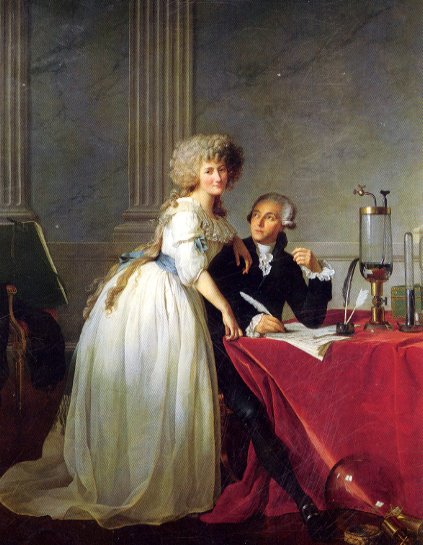Lavoisier
(1743-1794)

- the father of modern
chemistry
- best known for a new
theory of combustion and respiration in which oxygen is consumed instead of
phlogiston being released
- his new theory was based
on very careful, quantitative weight measurements
- mass was conserved during
chemical reactions
- repeated earlier
experiments
Regarding combustion:
- charcoal + oxygen
--> ash
Regarding respiration:
- oxygen is taken into
the body from the air
- air = mephitic air
(nitrogen) + eminently respirable air (oxygen)
- when oxygen is gone,
breathing stops
Regarding Boyle's metal
calx formation in sealed retorts:
- metal calx does form on
heating
- total weight of the
sealed retort is unchanged
- when opened, air rushes
in and total weight increases
- the increase in total
weight matches the difference in weight between the metal and the heavier
metal calx
- metal + oxygen -->
metal calx
Regarding Priestley's
preparation of "dephlogisticated" air:
- mercury calx -->
mercury + oxygen
Regarding Cavendish's
formation of water:
- inflammable air
(hydrogen) + oxygen --> water
- water is a compound not
an element
- reverse experiment also
performed
Regarding reducing metal
calxes:
- metal calx + charcoal
--> metal + ash + fixed air
Other contributions of
Lavoisier:
- helped introduce a
modern naming system, e.g. calx = oxide
- published the first
modern chemistry textbook, "Elements of Chemistry", in 1789
- introduced the modern
definition of the element (a substance that can not be further decomposed)
- produced a table of
elements (it included heat and light)
- explicitly stated the
law of conservation of mass during chemical reactions
Lavoisier was beheaded
during the French Revolution in 1789.
- Lagrange, "It took
them only an instant to cut off that head, and a hundred years may not produce
another like it."
Charles

